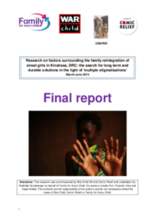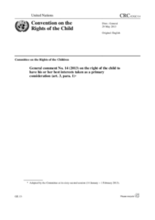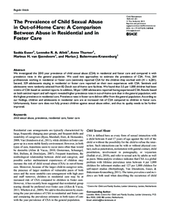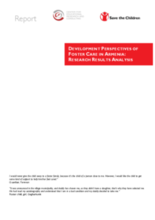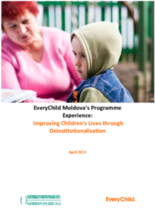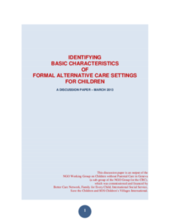Displaying 1931 - 1940 of 2221
This research looked at the factors affecting the family reintegration of girls in the Tshangu district of Kinshasa (DRC), an operational zone of the local NGO OSEPER, a partner of War Child for a 3-year project, seeking to address the needs of street-connected girls, including family reintegration.
General Comment 14, issued by the Committee on the Rights of the Child, refers to article 3, paragraph 1, of the Convention on the Rights of the Child that asserts the right of the child to have his or her best interests taken as primary consideration in all actions or decisions that concern him or her (in both the public and private spheres).
The multidimensional standardised assessment tool, the North Carolina Family Assessment Scale—Reunification (NCFAS-R) was used in this study by practitioners to assess family strengths and needs in case planning and reunification decision making. The current paper examined (1) whether NCFAS-R domain ratings at intake and closure differ by characteristics of parents and children; and (2) whether reunification is predicted by NCFAS-R score at closure.
Researchers investigated the prevalence of child sexual abuse in foster care and residential care facilities and found that 3.5 children per 1,000 had been victims of child sexual abuse.
This report produced by the Center for Educational Research and Save the Children summarises a broader research study which examined the foster care pilot programme introduced in Armenia in 2005. The study aimed to find out if the pilot program succeeded, what problems arose, how the program could be improved and how foster care in Armenia could develop and expand effectively.
This Program Review documents the evolution of EveryChild/Partnerships for Every Child’s Program in Moldova since 1994, presenting the development of interventions to improve the lives of children through deinstitutionalization and identifying the best practices and lessons that may be relevant, useful, and replicable to other initiatives and organizations around the world.
This report, published by the National Society for the Prevention of Cruelty to Children (NSPCC) in the UK, highlights the need to improve outcomes for children leaving care and returning to parents or families. The NSPCC provides recommendations for policymakers and practitioners to improve the quality of assessment, planning, and preparation regarding when and if a child should be returned home from care and to increase the support for children and their families once they return to their families.
This article presents the findings of an exploratory survey of community perceptions about foster care conducted in Udaipur City, Rajasthan, India, in order to assess the prospects for implementing foster care as an alternative to the dominant system of institutional care available to orphaned and abandoned children in India.
This new radio report from US National Public Radio (NPR) challenges some of the misconceptions about fostering, including that people foster for the money or that foster parents “must be saints to take in other people’s children”. Two main speakers, a foster parent for over 15 years to more than 40 children, and a Professor at the University of Richmond School of Law share their insight and experiences about fostering in the US context.
The discussion paper provides an overview of existing definitions of formal care within the UN Guidelines and a summary of the basic characteristics identified for each, together with explanations for the proposed characteristics.

